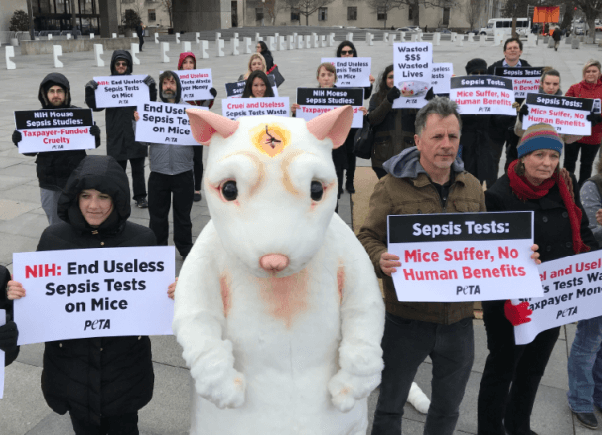Major Health Agency Slashes Funding for Sepsis Experiments on Animals After Push From PETA
PETA has been saying this loud and clear for all to hear: Sepsis experiments on animals are cruel and utterly useless for understanding the deadly condition in humans.
We have plastered it on placards, bombarded officials with hundreds of thousands of e-mails, shared video messages from humans who nearly died of sepsis, and filed a landmark lawsuit to get someone in power to pay attention. Now government officials are finally listening.

The National Institute of General Medical Sciences, a major funder of research on sepsis—the body’s extreme response to infection—just announced that it will stop funding the most common types of experiments that are used in an attempt to mimic the painful condition and instead put its resources toward superior, human-relevant methods.
This lifesaving about-face means that pointless experiments—in which animals are sickened in horrible ways and killed—will no longer receive millions in taxpayer funding from the agency. This is what PETA wanted all along.
A Turning Point for Medical Research
The monumental decision was announced on June 4 at the Shock Society’s Annual Conference, a gathering for sepsis research that was attended by a PETA neuroscientist. The agency declared that it was “unwilling” to fund commonly conducted sepsis experiments that use mice, sending shockwaves through the audience of animal experimenters.
Doubling down, the agency encouraged attendees to instead pursue animal-free research methods such as those that use human cells, specimens, and data sets—methods that parallel those PETA has repeatedly recommended in our Research Modernization Deal.
The National Institutes of Health (NIH) has known since 2013 that sepsis (and experiments that attempt to mimic it) doesn’t affect mice in the same way that it affects humans. The agency’s then-director noted that the drugs used successfully in mice failed to help humans because they were treating a completely different condition.
But NIH still doled out taxpayer money every year since then for experimenters to inject mice with toxins or feces, puncture their intestines, or force-feed them harmful bacteria. Once riddled with infection, the animals endured painful symptoms including fever, chills, diarrhea, and organ failure, and they eventually died.
How PETA Got Us Here
The new policy announcement comes after PETA filed a landmark lawsuit in 2021 challenging NIH’s funding of sepsis experiments on animals—despite decades of failures, wasted taxpayer money, and mountains of evidence that animals are poor models for sepsis research in humans.

The pending lawsuit alleges that the agency is violating its legal obligation to reduce the number of animals used in experiments, minimize their suffering, and fund research that benefits human health.
After having known for more than a decade that its sepsis experiments on mice don’t translate to humans, the National Institute of General Medical Sciences is proving that PETA was right all along and finally beginning to align sepsis research with an evidence-based approach that spares animals needless cruelty while seeking relief for the 1.7 million Americans who suffer from the condition each year.
What You Can Do
Please take action by telling NIH to halt its funding for all cruel and pointless sepsis experiments on animals:


